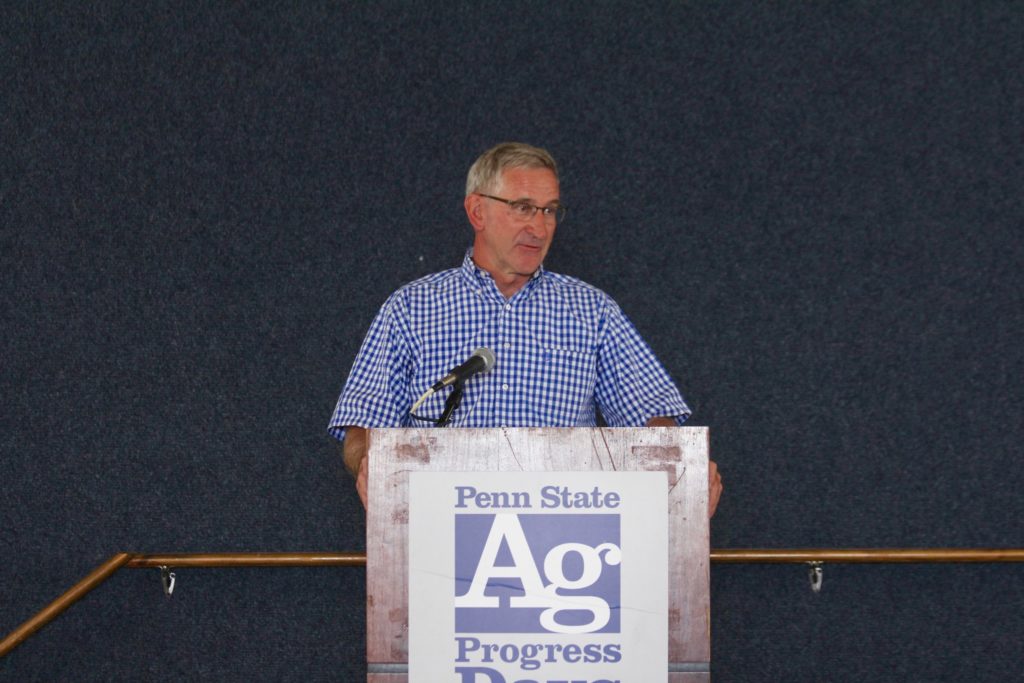U.S. Sen. Bob Casey, D-Pa., and Rep. Glenn Thompson, R-Howard Township, joined university and commonwealth officials on Wednesday afternoon at Penn State’s Ag Progress Days to discuss the future of agriculture in Pennsylvania and across the country.
“We have a lot at stake here in Pennsylvania,” Thompson said. “Agriculture is our number one industry and it’s an economic engine for our communities.”
Speaking at the Government and Industry Luncheon, Casey and Thompson highlighted approved and proposed legislation to benefit agricultural producers and processors.
The Inflation Reduction Act, which passed in the Senate last weekend, includes $20 billion in new funding for U.S. Department of Agriculture conservation programs that will support farmers’ work in dealing with climate change.
“No state, no group of farmers in the nation does a better job of conservation than Pennsylvania farmers. But you need help,” Casey said. “We need to help farmers in their efforts to combat climate change and the good work they do, and this bill will do just that.”
He also emphasized aspects of the Infrastructure Investment and Jobs Act, which was signed into law in November, that will directly aid farms and rural communities.
One of those is the $65 billion designated for expanding broadband internet access across the country. Casey noted that farmers who live in rural communities often lacking in broadband access need high-speed internet to maximize growing seasons, using GPS technology to map their land for the best places to grow certain crops, and for devices that can give early alerts when equipment is in need of repair.
The bill also provides $13 billion for transportation infrastructure in Pennsylvania, which Casey said will have a “disproportionately positive impact on rural communities,” where approximately 60% of the commonwealth’s roads and bridges are located.
“We’re a state of 67 counties, but we have 48 who are rural. We’ve got to make sure when it comes to state or federal policy that we are speaking directly to those 48 rural counties and the people who live in them,” he said. “So whether you consider those rural communities or you’re just thinking about agriculture, this bill is going to help.”

Thompson, meanwhile, touched on two pieces of legislation he has introduced that he says will help address critical issues facing farmers.
The Young Farmer Success Act, introduced last month by Thompson and Rep. Joe Courtney of Connecticut, would add farming to the list of professions eligible for the Public Service Loan Forgiveness Act, a group that currently includes, government service, teaching and nursing. It would forgive the balance of their student loans forgiven after making 10 years of income-based payments.
“Right now there are critical shortfalls of young and beginning farmers and ranchers,” Thompson said. “The average of the farmer in this country is 57 and a half. That’s why I introduced the Young Farmers Success Act.
“Food security is national security. Making sure we have that next generation of farmers and ranchers and foresters is critically important.”
Thompson also introduced last year, with Rep. Antonio Delgado of New York, the Whole Milk for Healthy Kids Act, continuing his long-running effort to allow flavored and unflavored whole milk to be offered once again as an option in school cafeterias.
The Healthy, Hunger-Free Kids Act, passed in 2010, set new nutritional standards for school meals and subsequently higher-fat milk was barred. Thompson, however, cited the health benefits derived from milk fat and the economic benefits to the dairy industry, which is the largest sector of Pennsylvania’s agricutural production and which has struggled over the past decade due to a combination of lower milk consumption, rising overhead costs, supply chain disruptions and COVID-19.
“It really decreased access to nutrition and quite frankly to a good milk experience,” Thompson said. “This decline in milk consumption has also had a devastating impact on the dairy industry.”
As Republican leader of the House Agricultural Committee, Thompson also likely will play a key role in the development of the next Farm Bill, which is revised and renewed every five years to set federal agricultural and food policy. The comprehensive legislation, which is due in 2023, deals with everything from farming and processing to the Supplemental Nutrition Assistance Program.
“We will travel to every corner of the country to meet with farmers and ranchers and growers, processors, key stakeholders in our rural communities,” Thompson said, adding that he expects that process to kick off at the Pennsylvania Farm Show in January.

Casey and Thompson both offered praise for Penn State’s work serving agriculture in Pennsylvania and nationwide through research, Extension and education. Pennsylvania Secretary of Agriculture Russell Redding said the university’s College of Agricultural Science plays a critical role statewide.
“There’s not a program that we work with to tackle an issue we’re concerned about that does not have at the very center the work of Penn State,” Redding said.
Penn State President Neeli Bendapudi, who took office in May and was attending her first Ag Progress Days, said the three-fold mission of the land-grant university was on full display at the event: social mobility through education, research with an impact, and providing economic development and service to communities.
“We are the only land-grant university in the state, so we belong to you….,” she said.
“You give us the safe, abundant and sustainable tools that bring us all together. When you break bread together you become family. … Food reminds us that we are all part of the human family.”




